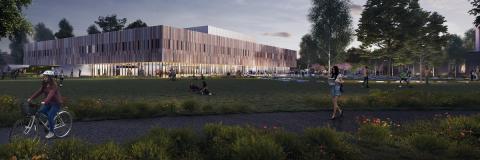
Sidebar navigation

Our commitment to the planet
Environmental policies and sustainable procedures
One of our strategic priorities is to become one of the UK's leading universities in environmental sustainability
To reach this goal, we will:
By continually improving our sustainability practices, we’re working towards a low-carbon future to minimise our impact on the environment.

1. Achieve transformation through research
Our research is finding innovative and sustainable solutions to major issues threatening the future of our planet and the health of our environment.
Finding solutions through research
We’re already making a positive impact.
Our research responds to challenges, influences policy and helps change the world for the better. Our incredible research is making a positive difference to lives both locally and all across the world. It has benefits far beyond academia, exploring areas such as the environment, economics, culture, government policy, sustainability and so much more.

2. Promote sustainability through civic leadership
Through strategic partnerships in the city, we’re promoting long-term environmental sustainability and raising the quality of life in our community.
Addressing climate change in Portsmouth
We’re working with our partners to assess the climate risks to our city via the Portsmouth Climate Action Board, chaired by Professor Steve Fletcher, Lead of our Sustainability and the Environment research theme. We also run Portsmouth Climate Festival in collaboration with the City Council.
Tackling plastic pollution
As a civic university, we're committed to supporting the local community through our research and activities. As part of Revolution Plastics, we’re working with partners to facilitate the city’s transition to a sustainable future, particularly in relation to plastic pollution and recycling. We’ve started a city-wide survey to map Portsmouth’s plastic litter and we’re working with Portsmouth Football Club to arrange beach cleans.

3. Partner with our students and staff on sustainability
We encourage all members of our community to live, think and work with sustainability in mind, and make positive changes by using less energy and water, reducing waste, and choosing sustainable travel options.
Supporting staff and students to take action
Sustainability is included in our staff induction to support staff in taking meaningful environmental and climate action in the workplace.
We offer advice on sustainable travel to campus, including a term time bus service.
For students we also share guidance on how to live sustainably at university — like eating green and recycling in the city, including our specialist recycling points on campus. Our Students’ Union provides opportunities for students to help the environment via groups such as the Eco Society.
Sustainability focussed degrees
Many of our degree programmes directly provide students with knowledge and experience relevant to sustainability, such as BEng (Hons) and MEng Renewable Energy Engineering, and courses in the School of the Environment and Life Sciences. We're continually reviewing our curriculum to identify opportunities for our students to enhance their knowledge on sustainability.

4. Deliver sustainability across all our operations
Our ambition guides every aspect of our operations – from development of our campus and environmentally friendly catering to sustainable corporate systems and procedures.
We’ve already made progress:
- We've reduced our carbon emissions by 50% since 2009
- Our electricity is 100% renewable
- We've increased our recycling rate from 40% to 70% since 2011
- We’re aiming for all our new buildings to achieve ‘Outstanding’ ratings for sustainable design from BREEAM (the world’s leading sustainability validation and certification system) and ‘A’ rating for energy use and carbon emissions
- Our new Ravelin Sports Centre is one of the most sustainable sports facilities in the UK
- We currently waste only 2% of our food
- We’re eliminating single-use plastic from products sold in our campus cafes
- Our graduation gowns are made from 70% recycled polyester, which is manufactured from recycled plastic waste. Every gown contains a minimum of 550g of recycled plastic waste, which equates to around 30 plastic bottles (500ml). The other 30% is viscose for a soft finish.
Policies and objectives
Explore our policies and accreditations that relate to our environmental sustainability objectives at Portsmouth.
Can't find what you're looking for? Search all our policies and standards.
Our sustainability team
Senior management
Our Director of Estates, Tahir Ahmed, chairs the University's Environmental Sustainability Working Group in collaboration with the Campus Services.
Sustainability staff
Our Energy and Environment Team consists of two professionals with a remit that covers sustainable travel, carbon management, environmental legislation compliance systems, energy, water and waste contracts, and associated budget and invoice management. The team includes:
-
Phil Horton, Sustainability and Utilities Manager
- Tolulope Akanimodo, Energy and Carbon Performance Manager
- Kimberly Williams, Sustainability and Utilities Co-ordinator
The team cover operational sustainability project improvements in the region of £200,000 annually.
There are a further eight staff and an external Advisory Council engaged with our Revolution Plastics initiative, which aims to find solutions to global plastic pollution.
If you would like to speak to the team, reach out to us at sustainability@port.ac.uk
Sustainability news and events
News
View all news
Can advertising ever drive sustainability?
24 October 2025

Counting plastic reveals hidden waste and sparks action
3 October 2025

Scientists call for urgent reform of ‘outdated’ rules blocking marine restoration
2 October 2025

Citizen scientists reveal global hotspots of plastic pollution
29 September 2025

Launch of World’s First Centre for Species Survival on Coral Conservation
15 September 2025
Blogs
View all blogs
Chemical pollutants affect wildlife and human behaviour. But industry toxicologists are reluctant to carry out tests, new survey reveals
Alex Ford

‘Greenhushing’ is a trend that leaves businesses downplaying their environmental wins
Marta Nieto-Garcia

Three reasons plastic pollution treaty talks ended in disagreement and deadlock (but not collapse)
Steve Fletcher

As climate change hits, what might the British garden of the future look like?
Adele Julier

